Boutique coffee is only roasted in light? Is deep roasting a boutique coffee? Do deep-baked coffee beans taste good?
Professional coffee knowledge exchange more coffee bean information please follow the coffee workshop (Wechat official account cafe_style)
The third wave of mainstream fine coffee
Today's cafes often emphasize that they are "boutique coffee". What exactly is "boutique coffee"? Why do more than 90% of the stores choose to use the so-called shallow roasting to explain the flavor of raw coffee beans in their own baking such as wild flowers?
As long as you pay a little attention to the coffee article, most coffee lovers should have heard of the "third wave of boutique coffee" that is now popular in the coffee world. The first wave and the second wave of coffee brought about the revolution of "coffee" in the world of coffee. If the first wave of coffee brought instant coffee, making it easier for people to drink coffee; the second wave of coffee promoted espresso and improved the quality of coffee, and coffee began to change from a necessity to a luxury; then the third wave of boutique coffee pays more attention.
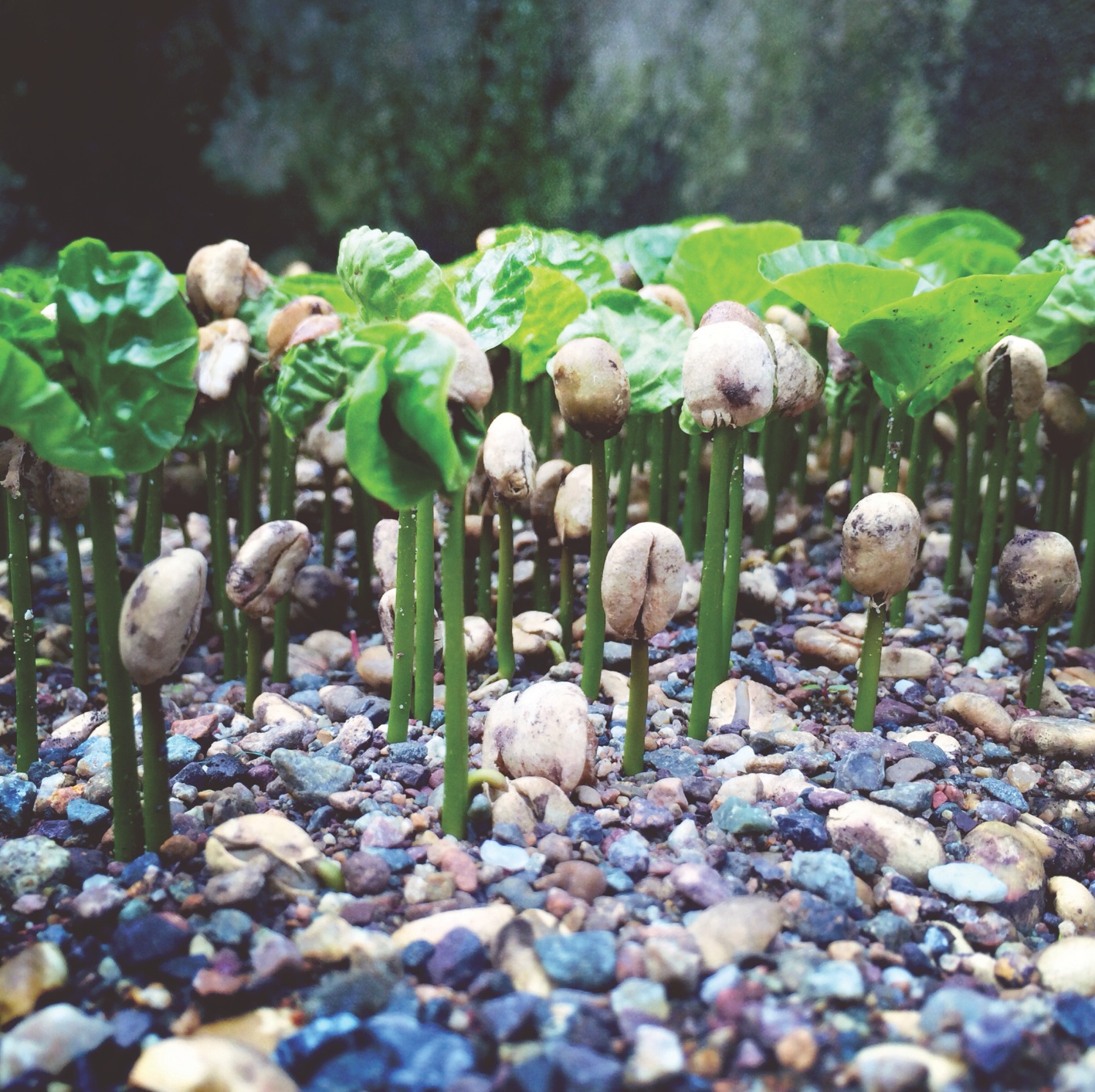
Sun exposure, water washing, honey treatment, low pollution treatment, producing area farming, micro-batch … The third wave of boutique coffee has many demands, but its core pursuit is only a little ─ "style".
[Terroir soil] the concept comes from the world of wine and is mainly about the fact that any small condition of origin can change the flavor of a bean.
In the past, we used to distinguish the flavor of coffee by "Ethiopia", "Blue Mountain" and "Kenya", but now we have to talk not only about "Ethiopia", but also about the large producing area "Yega Xuefei", the small producing area "Cochelle", and even the processing plant "Poliphine", the treatment method "solarization", the grade "G1", the altitude "1800M--2300M" and the variety "Ethiopian native species". And the story of Project Red Cherry.
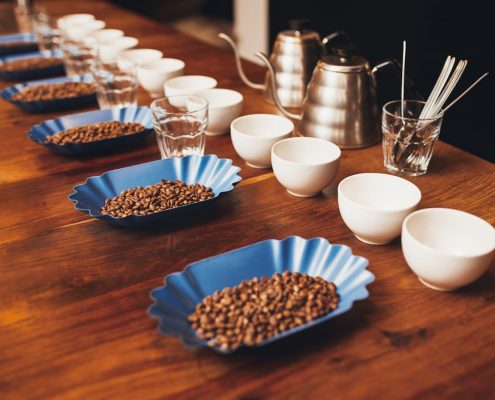
There are so many labels so that we can use "knowledge" as much as possible to approach the "flavor" that we have not yet drunk. In short, it makes it easier for consumers to find or find their favorite beans and flavors. It is precisely because of the emphasis on such a primitive and meticulous flavor presentation, "shallow baking", this degree of baking has become popular.
In the degree of shallow roasting, the "local" of coffee itself is most likely to be expressed, and the bright and lively flavor of sour fruit is probably the flavor that this degree of roasting wants to present, coupled with "black" coffee extraction methods such as hand brewing, siphon and Philharmonic pressure. it is the practice that is most in line with the core concept of the third wave of boutique coffee.
Lightly roasted coffee also contains more chlorogenic acid. Many coffee studies have reported that this ingredient can improve high-density lipoprotein cholesterol, protect the liver, slow down arteriosclerosis and other effects, taking advantage of the natural diet that has sprung up in recent years to make fine black coffee even more prosperous.

In the extraction, because the cell wall of shallow roasted coffee is less damaged, it doesn't matter that we can use a little more violence in the extraction. That is, fine grinding (the size of fine sugar), high water temperature (about 88 meters 92 degrees), high water flow (height of hand flushing pot, pressure by throwing the pot, etc.), high ratio of water to powder (about 113.33 color 1mura 16.67).
Of course, this is only a rather general statement. Because everyone likes different tastes, so what is suitable for everyone is certainly different.
Light roasting is so popular in the domestic coffee industry that many enthusiasts may shake their heads and sigh at the sight of deep-roasted coffee: "Chinese herbal medicine". This situation is all too normal. The popular trend reflects the market demand, which is limited and the knowledge is popularized.
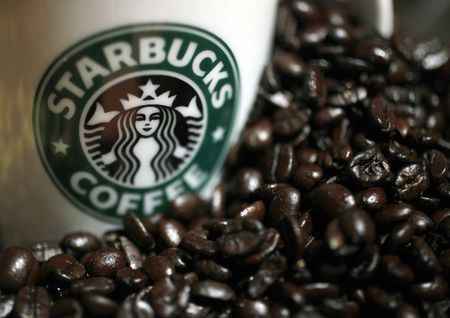
As the representative of the second wave of coffee, Starbucks naturally has the opposite attribute of fine coffee, so many people avoid Starbucks' main deep-roasted coffee beans. They even think that "only poor beans will use deep-roasting techniques to hide the smell" and "the taste of deep-roasted coffee beans will become almost the same after deep roasting." There is no flavor at all. "Deep-baked beans are unhealthy for the human body."
Is that true? Today, we are going to talk about whether the boutique coffee can be deep-roasted.
First of all, let's talk about why deep baking exists.
First: from the current mainstream SCA system to discuss
Discussed from the current mainstream SCA system, deeper baking can modify the acid that is too strong and sharp. For example, why did Mantenin and Kenyan AA tend to take deeper baking? The main reason is that because of the origin and treatment, the acid quality of these two beans is strong, while deep baking plays a great role in slowing down the stimulation of acid on the human tongue and turning it into sweetness and mellow.
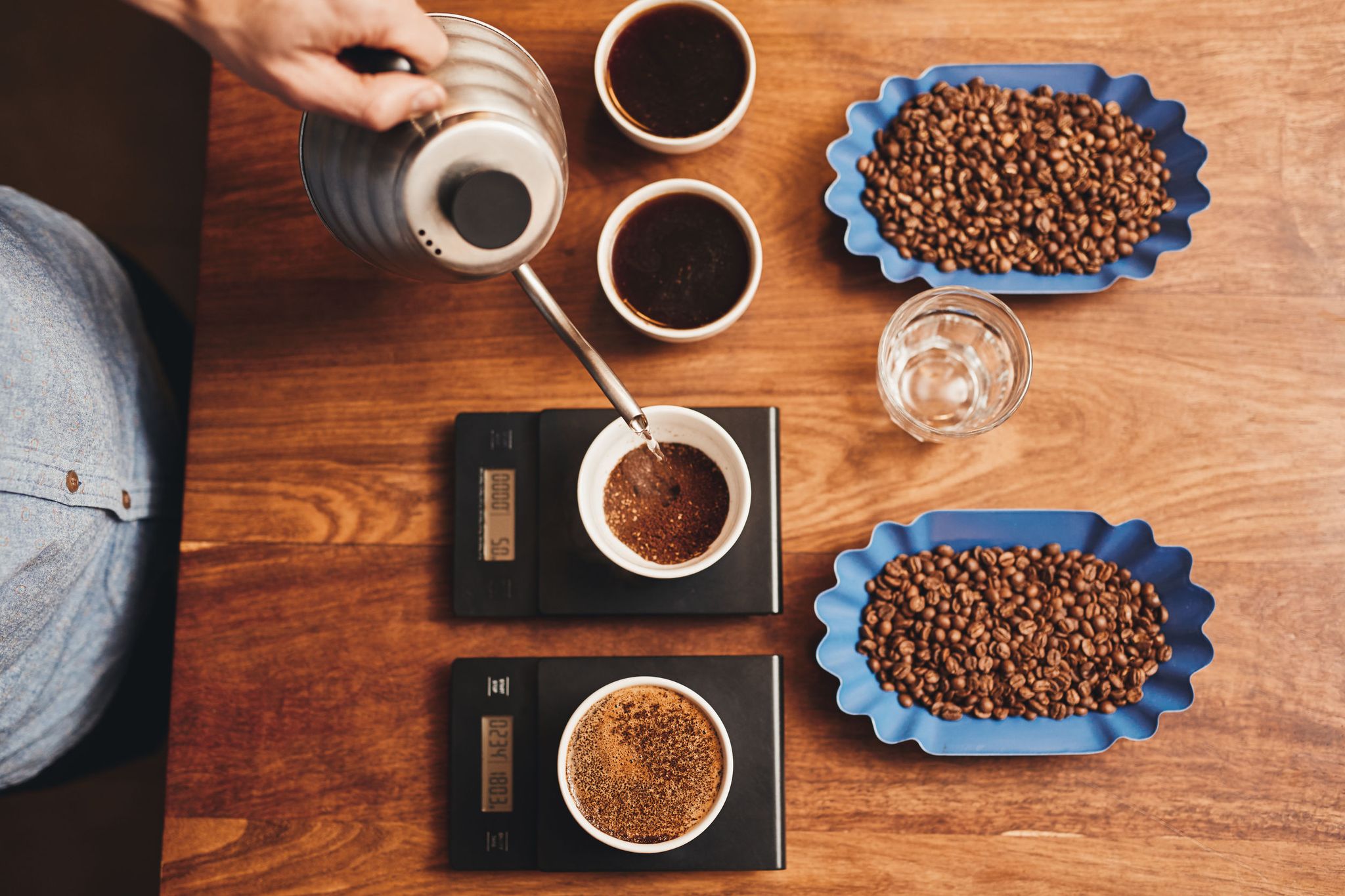
Second: discuss it from the concept of old Japanese tea shop.
When it comes to deep baking, many people will subconsciously put the prefix of "Japanese style", just like mentioning "shallow baking". Many people will think of "Nordic shallow baking". When it comes to deep baking, you can't avoid Japanese coffee. According to the coffee concept of the old Japanese tea shop, what they care about is that "coffee should have the most variety of good levels" and "elegant sweet and bitter taste". For the former, the source of coffee flavor is not only its own flavor, but also the flavor that can be given by roasting. The concept of the third wave of boutique coffee is to "keep the former as much as possible", while the concept of the old Japanese tea shop is to "try to take the maximum value of the sum of the two."
In addition, the concept of Japanese coffee is different from the SCA system, including "elegant sweet and bitter taste" (not bitter taste) into the so-called "good taste" (SCA vice versa). Under the long-term cultural habits, the deeper baking degree is taken for granted as the taste memory of the exclusive Japanese tea shop.
Most of us have imaginations of deep baking, such as bitterness and smoking, mainly because most of our methods of dealing with deep baking are "stir-fry quickly over a big fire", while Japanese baking insists on "baking slowly over a small fire". Therefore, under the same deep baking, the Japanese style is relatively easy to leave more of the sweetness and mellowness of coffee.
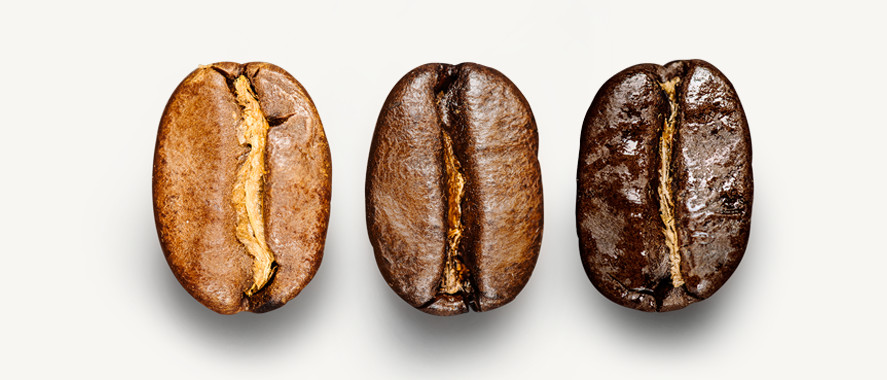
So, is it true that deep baking won't use good beans, because they all taste the same anyway?
Of course not!
It is not that the better beef is not suitable for making sukiyaki, nor is the better fish not suitable for making Fish Head en Casserole. The use of better ingredients is absolutely different from the use of poor ingredients will show a different taste.
If you are lucky enough to drink the very deep roasting of boutique-grade coffee beans and ordinary batches of coffee beans in Laotou tea shop in Japan, you will find that there is a significant difference in sweetness, aroma and level between the two. Definitely not any baker or any raw bean tastes the same-it mainly depends on the baker's skill & whether the raw bean is of good quality or not.
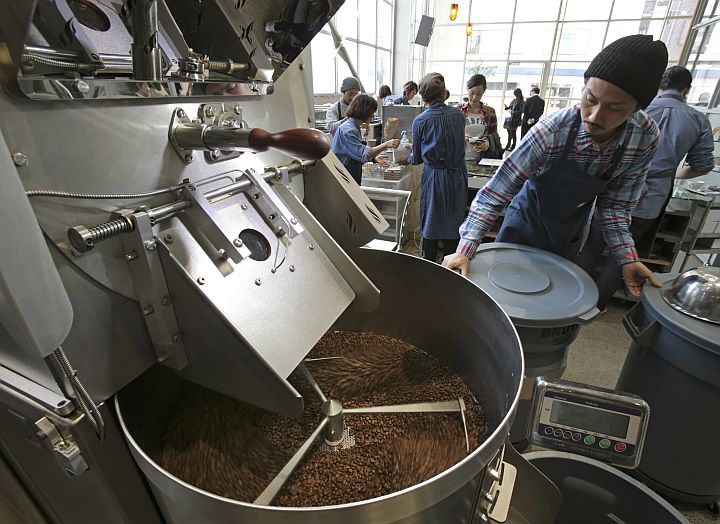
This is why deep baking that tastes good is always harder to find than shallow baking.
Despite the taste hobbies caused by local cultures, deep baking requires precision, control and concentration for longer than shallow baking.
According to what the editor once heard, a good "charcoal-roasted coffee" takes at least 30-40 years for coffee makers to make excellent and stable quality. Although this is an era when there is no data to assist in the accumulation of experience, we can see the difficulty of deep baking. The reason why deep roasting has become a "non-mainstream" in the boutique coffee industry has something to do with its stringent requirements for experience accumulation.
If you have the opportunity to go to Laotou tea shops in Japan that sell boutique coffee, please be sure to give it a try-- of course, you have to meet 1. There is a boutique grade 2. Master kung fu is authentic 3. Under the premise of sufficient qualifications, the chef will be able to taste the unforgettable taste of deep-roasted coffee.
And deep baking is definitely not an unhealthy bean. As long as it is "appropriate and skilled" deep-baked beans, the impact of coking substances on the human body can be avoided to a great extent. Deep-roasted coffee beans also degrade more trigonelline and produce more niacin (commonly known as vitamin B3), which is also a beneficial ingredient for the human body.
In recent years, scientists have also found that coffee also contains a variety of other chemicals that stimulate gastric acid secretion. In the course of the study, an active substance, NMP (N-methylpyridium), was accidentally found, which can block the ability of stomach cells to produce hydrochloric acid and reduce stomach discomfort.
Interestingly, NMP does not exist in raw coffee beans and can only be produced through the roasting process, and the deeper the roast, the higher the content, which means that drinking deep-roasted coffee is less harmful to the stomach. In addition, the content of acid which is easy to cause stomach discomfort is less in deep-baked beans. Veronika Somoza, a professor in the Department of Nutrition and Physiology at the University of Vienna in Austria, pointed out that the content of NMP in deep-roasted coffee may be more than twice that in light-roasted coffee. So, is it easy to have a cold stomach and heartburn when drinking shallow roasted coffee? Then you may be more suitable for drinking coffee with a little deeper roasting.
However, it is difficult to tell whether a bean is "properly deep-baked" or "charred" from its smell and appearance alone; like steak, there is a fine line between "charred" and "perfect Mena reaction shell". So, it can only be decided by the taste?
Unfortunately, there are few substances available for extraction in deep-roasted coffee compared with light-roasted coffee, and because of the serious damage to the cell wall, the extraction is much easier than shallow roasting. It is conceivable that it will boil bitterness. Because of the great difference in the degree of cell wall damage, the two roasting degrees are also quite different in the concept of extraction. If you want to brew a cup of sweet and mellow deep-roasted coffee, you still need to pay attention to it.
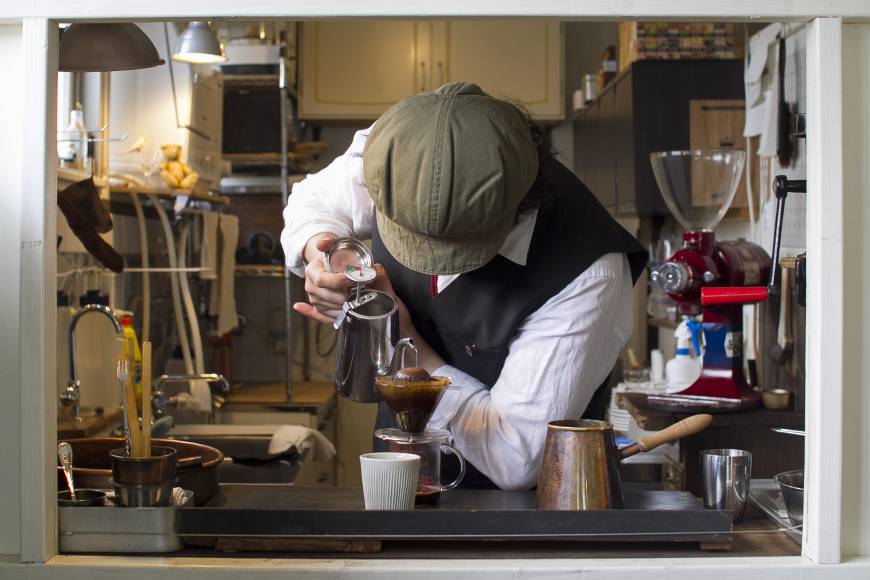
Unlike light baking, the aroma and sweetness of deep baking are provided by relatively large molecules of "brown pigment", so it takes a relatively long time to extract. But also because it is easy to extract, it is necessary to "reduce disturbance as much as possible", in other words, "treat coffee powder as gently as possible" and slowly inject water in order to achieve these requirements at the same time.
Finally, don't blame a well-baked deep-roasted coffee! If you come across any delicious deep baked beans, remember to share them with the editor!
END
Important Notice :
前街咖啡 FrontStreet Coffee has moved to new addredd:
FrontStreet Coffee Address: 315,Donghua East Road,GuangZhou
Tel:020 38364473
- Prev
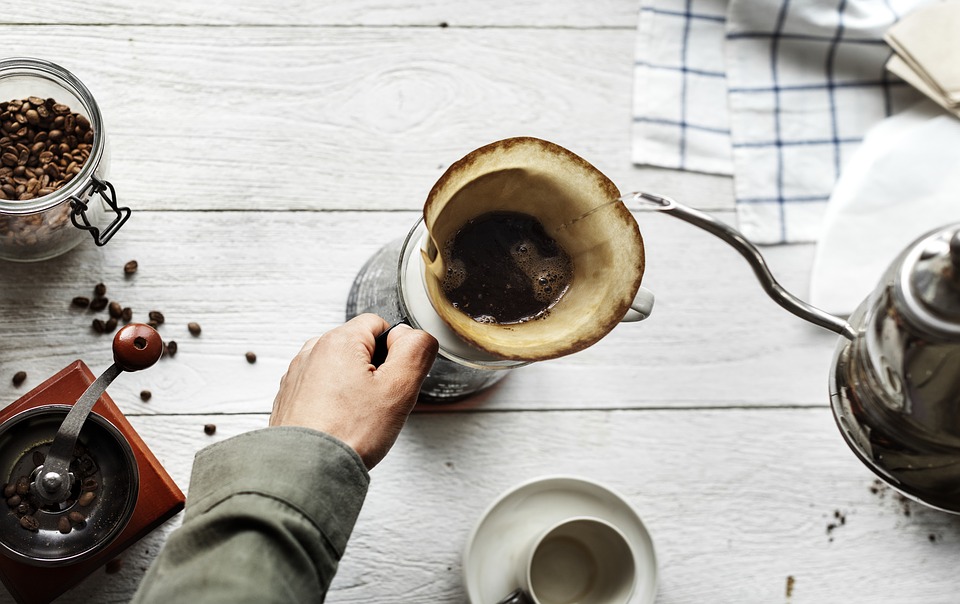
How to prevent the quality of hand-brewed coffee from declining after it gets cold? Why do you drink coffee while it's hot?
Professional coffee knowledge exchange more coffee bean information please follow the coffee workshop (Wechat official account cafe_style) last week, we in "before the coffee gets cold?" Good coffee should be drunk before it gets cold! This paper introduces one of the reasons why coffee goes bad after it is cold: oil oxidation. Today we will continue to talk about the remaining one of the deteriorated pigment oxidative polymerization and
- Next
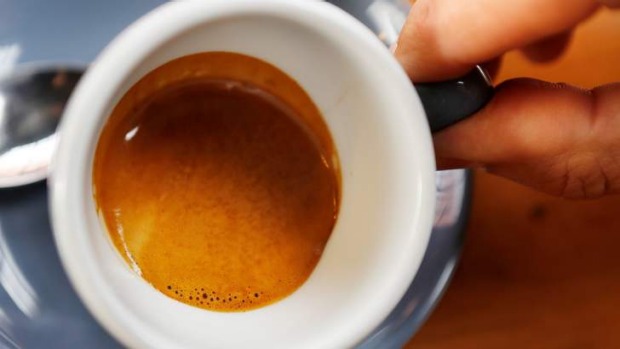
Effect of Oil on Coffee Flavor what is the effect of Coffee Oil on Flavor and Health?
Professional coffee knowledge exchange more coffee bean information please follow the coffee workshop (Wechat official account cafe_style) whether you like coffee, espresso or Turkish coffee, the degree of roasting is light to deep roasting, basically, it is difficult to ignore the effect of coffee oil on a cup of coffee. Some people care about the so-called "Body" when they drink coffee, which has something to do with fat.
Related
- Beginners will see the "Coffee pull flower" guide!
- What is the difference between ice blog purified milk and ordinary milk coffee?
- Why is the Philippines the largest producer of crops in Liberia?
- For coffee extraction, should the fine powder be retained?
- How does extracted espresso fill pressed powder? How much strength does it take to press the powder?
- How to make jasmine cold extract coffee? Is the jasmine + latte good?
- Will this little toy really make the coffee taste better? How does Lily Drip affect coffee extraction?
- Will the action of slapping the filter cup also affect coffee extraction?
- What's the difference between powder-to-water ratio and powder-to-liquid ratio?
- What is the Ethiopian local species? What does it have to do with Heirloom native species?

